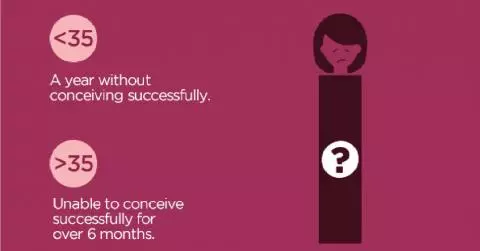Why Am I Not Getting Pregnant? Common Causes and Solutions for Infertility

For many couples, the path to parenthood can be riddled with obstacles and emotional ups and downs. Especially when the pregnancy test returns a negative result, it's natural to wonder, 'Why am I not conceiving?' Though getting pregnant may appear to be one of the simplest things, but it is not always the case. And you are not alone if you have been trying for quite some time and are wondering why you aren't pregnant yet. So, what might be going on? On this page, let's look at a few of the reasons for not getting pregnant.
Why am I not getting pregnant? This might be the reason!
Here are some of the reasons for not conceiving:
Missing Fertile Window
This is one of the primary reasons for not getting pregnant when everything is normal.
Being unfamiliar with your own cycle of periods can be a disadvantage because there are just a few days per cycle when it is possible to conceive. The length of the menstrual cycle is 28 days on an average, but it is possible to have periods that can last as little as 20 days or as long as 35 days.
The first issue is to determine the length of your cycle. Many individuals do not start counting on the actual starting day of their period. Instead, they may count the day following or the day prior to that. Using an ovulation or period tracker app, as well as keeping a menstrual cycle calendar, can help.
From there, you can predict when you will ovulate simply by calculating backwards from the very first day of your subsequent predicted period.
Having Too Little Intercourse
Yet another reason for not getting pregnant even if everything is normal.
To conceive, you must have sex, specifically around the period of ovulation, which occurs when an individual releases an egg. However, it is critical to do it more frequently throughout your menstrual period rather than only when you are most likely to become pregnant.
Having sex informs the body that it is ready to conceive. Based on research, the immune system transitions from one that is focused on fighting illness to one that is ready for reproduction.
Biological Factors
Age
Odd as it may appear, older age can affect an individual's ability to conceive. Simply put, once you reach the age of 30 years, your fertility begins to fall and continues to decrease with every year that passes. The American College of Obstetricians and Gynaecologists (ACOG) states that by the age of 45 years, fertility in women has dropped to the point that conceiving naturally is unlikely.
Knowing that getting pregnant becomes increasingly difficult as you get older might help you establish expectations and prepare for the future. While there is no medical way to ensure you are fertile into your late thirties and forties, you can consider in vitro fertilisation (IVF). If it is unclear whether or not you want to have a family, you can have your eggs or/and embryos retrieved and preserved for later IVF.
Partner's health
Partner’s health is one of the major causes of not getting pregnant.
While it is common to blame the person having the uterus for delays in pregnancy, reproductive problems do not discriminate. As a matter of fact, instances of infertility can be roughly divided into 40% female, 40% male, and 20% that consist of both. There is also the possibility of unexplained infertility, which affects around 15% of instances.
For instance, just as advancing age can hinder fertility in women, it can decrease fertility in men as well. Sperm volume and motility, both necessary for conception, drop with age.
Another problem to be careful of is varicocele, which is a bulge in the veins that causes blood to accumulate. This disorder may occasionally affect male fertility. The good thing is the fact that it is treatable, which increases the likelihood of conception.
Ovulation Disorder
Ovulation, or the release of an egg from one's ovaries, is necessary for conception. It's an intricate process that necessitates a surge of hormones promptly before the egg reaches its destination, and even minor changes may set everything off.
Ovulation problems are relatively frequent, accounting for around 25% of all infertility cases and being among the most common reasons for not getting pregnant. They could include:
- Primary ovarian insufficiency
- Hypothalamic amenorrhoea.
- polycystic ovary syndrome
- Hyperprolactinemia
If you suspect you have one of these conditions or have any concerns, contact your doctor for advice.
Uterine Tube Blockage
Assuming normal ovulation, the next step in a healthy pregnancy is fertilisation, which occurs when an egg meets a sperm. This typically occurs in the uterine tubes, which are also known as fallopian tubes. Following this, the fertilised egg will proceed down the tube and implant in the uterus. However, if these tubes become obstructed or damaged, these actions may be impossible. The sperm may be unable to move up the tube in order to get to the egg, or the damaged tube may result in the fertilised egg implanting within it. This is referred to as an ectopic pregnancy.
Polycystic Ovarian Syndrome (PCOS)
One of the most common causes of infertility in women is the condition PCOS. When someone has PCOS, the ovaries grow larger than usual. These larger ovaries may contain a large number of follicles carrying immature eggs. PCOS causes a woman's body to create abnormally high levels of androgens. High androgen levels interfere with egg formation and release. If a healthy and mature egg is not released, it cannot be fertilised by sperm; hence, you will not be able to become pregnant.
A change in lifestyle, combined with a correct diet and physical activity, can help manage PCOS and improve the chance of ovulation, boosting the likelihood of becoming pregnant.
Body Weight
Your weight may also influence how likely you are to become pregnant. According to one analysis, overweight women are more likely to have infertility, whereas a low BMI may influence the timing of periods and make it more difficult to ovulate, which is required for conception.
It's worth mentioning that weight can be one of the reasons for not conceiving; however, it is not an ideal way of assessing your well-being or fertility, both of which are influenced by a number of factors. If you happen to have any concerns, discuss them with your doctor.
Lifestyle Factors
Increased Stress Levels
High-stress levels can have a significant role in hindering pregnancy because high levels of the hormone cortisol, a stress hormone, can impair ovulation and fertility. However, when it concerns fertility, most are talking about significant levels of chronic stress.
Smoking and Alcohol Consumption
If you smoke, it affects your fertility as well. Smoking can impact fertility by:
- Increasing the likelihood of infertility
- adversely impacting the production of hormones
- Causes damage to the sperm DNA and reproductive system.
Additionally, there exists a possibility that heavy drinking leads to lower fertility rates.
If you or your spouse smoke or drink often and want to conceive soon, you should consult with a specialist about quitting. Avoiding smoking and limiting your alcohol consumption can benefit both your health and that of your future child.
Irregular Sleeping Pattern
People's immune systems suffer when they don't get enough sleep, which causes stress. Stress is one of the key causes of an irregular menstrual period. Lack of sleep can also impact men's sperm count and jeopardise their chances of conception. Make sure that you get 8-10 hours of sleep every day.
Underlying Medical Conditions
Health issues such as diabetes, thyroid issues, obesity, or irregular periods can have an impact on your ability to conceive. So, if you are suffering from chronic health issues, you should get them under control prior to trying to become pregnant.
Additional medical difficulties, like endometriosis or obstructed fallopian tubes, can complicate the process of conceiving. It is believed that up to half of individuals with endometriosis may have trouble becoming pregnant.
Before attempting to conceive, you should undergo a check-up, regardless of whether you have any known health difficulties. Schedule your pre-conception check-up as soon as possible. A fertility specialist can check for any medical concerns that may require treatment and assist you in developing a fertility plan.
Cancer Treatment
Some cancer treatments can have an impact on your ability to conceive. Your doctor will explain the potential risks of any therapy options to you, taking into account factors such as your reproductive status, age, and treatment type. The positive aspect is that there are options for preserving fertility prior to treatment for cancer, such as egg freezing.
Environmental Pollution
Whether you know it or not, pollution in the environment is one of the leading causes of infertility in underdeveloped countries. Pesticides, passive smoking, smoke, and carcinogens all have a direct effect on fertility.
Unexplained Infertility
From 10% to 30% of expecting parents never understand why they are unable to conceive. This is known as unexplained infertility or, more correctly, a lack of a proper diagnosis. However, the fact that you do not have answers does not preclude you from receiving treatment.
Regardless of whether your diagnosis is unexplained, you can undergo infertility therapy. Make sure to share any worries or queries that you might have with a fertility specialist so that you can determine the best course of action for you.
Conclusion
Sometimes infertility is beyond a person's control. There can be numerous reasons why a woman can’t get pregnant, including smoking, stress, and weight. Individuals can make changes based on these reasons to help avoid fertility problems.
However, if you are still concerned about infertility, consult a fertility specialist. They will be able to assist you in determining the present state of your fertility and advise you on what you can do to prepare for a possible future pregnancy.
 Infertility Counselling
Infertility Counselling Female Infertility Treatment
Female Infertility Treatment Andrology Treatment
Andrology Treatment Fertility Enhancing Surgeries - Female
Fertility Enhancing Surgeries - Female Fertility Enhancing Surgeries - Male
Fertility Enhancing Surgeries - Male Endoscopy Treatment
Endoscopy Treatment IUI Treatment
IUI Treatment IVF Treatment
IVF Treatment ICSI Treatment
ICSI Treatment Advanced IVF Solutions
Advanced IVF Solutions Embryology
Embryology Vitrification Egg, Embryo, Sperm Freezing
Vitrification Egg, Embryo, Sperm Freezing Preimplantation Genetic Testing (PGT)
Preimplantation Genetic Testing (PGT) Donation Program Embryo / Egg / Sperm
Donation Program Embryo / Egg / Sperm Self-cycleTM IVF
Self-cycleTM IVF

 Self-cycleTM IVF
Self-cycleTM IVF








